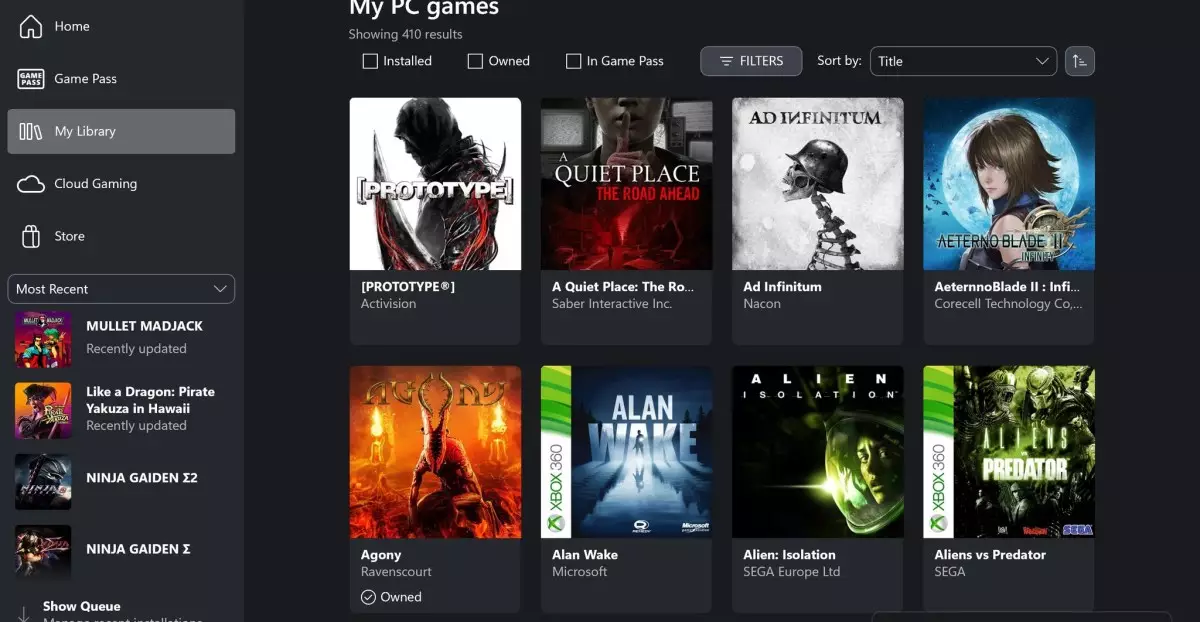The gaming world is currently experiencing a notable transformation, particularly as Microsoft leans into its ambitious vision of integrating Xbox and Windows functionality. Long viewed as separate ecosystems, signs are emerging that these two entities are on the verge of converging, creating a more cohesive gaming experience for players around the globe. Recent updates to the Xbox app for Windows indicate a step forward in this direction, raising intriguing questions about the future of gaming on Microsoft’s platforms.
Decoding the Mysterious Xbox App Updates
For those who have recently explored the Xbox app on Windows, you may have noticed an unusual addition: console games from the Xbox catalog are popping up in users’ libraries. While titles like the classic “Alan Wake” from the Xbox 360 era are not currently playable on PC, their inclusion suggests a more extensive effort than a mere technical glitch. This could be the initial manifestation of Microsoft’s strategy to consolidate Xbox and Windows into a unified gaming hub, wherein users can access a larger library of games, no matter the platform.
Tom Warren, a well-regarded senior technology editor who has been near the pulse of Microsoft’s strategies for decades, has been tracking this evolution closely. His insight into the matter posits that this integration is beyond mere speculation; it stems from a deliberate plan to create a universal library that encompasses both Xbox and PC games. The implications of this shift could be monumental if it resolves lingering compatibility issues that gamers face today.
The Significance of Project Kennan and Cross-Platform Harmony
In March, Warren unveiled details about Microsoft’s Project Kennan, a handheld console designed in collaboration with Asus, representing yet another dimension of Microsoft’s ambitions. This project embodies an effort to blend the best attributes of Xbox and Windows and deliver an all-encompassing resource for gamers. With other manufacturers, like Lenovo, already integrating SteamOS and crafting their own handheld solutions, Microsoft’s entry into this space could offer a vital alternative.
The overarching ambition of these initiatives is to create an ecosystem where games from various platforms—be it Steam, Epic Games Store, or Xbox—are easily accessible through a single library. The unification not only enhances user experience but also reinforces Microsoft’s position within an increasingly competitive gaming landscape, where convenience and flexibility are paramount.
Branding the Future of Gaming Platforms
The recent rebranding of the Xbox app to “Xbox PC” is telling of Microsoft’s intent to elevate this platform’s profile. This transformation was heralded during the announcements of notable titles like Gears of War: Reloaded, and gameplay trailers for upcoming games are now prominently showcasing the Xbox PC branding. Microsoft’s seamless introduction of a unified identity could further facilitate a gaming culture that feels interconnected rather than disparate.
The initiatives that underlie this branding shift involve making the Xbox app a central hub for PC gaming. By properly aligning the messaging and visual identity, Microsoft is effectively nurturing a community that thrives on synergy, encouraging gamers to view both Xbox and Windows as complementary parts of a singular gaming universe.
Looking Ahead: The Future of Cross-Platform Play
The crux of this evolving narrative rests on the vital question: will Xbox console games be playable on PC? For Microsoft to succeed in this venture, it must leverage its expansive cloud infrastructure in ways that allow gamers to access an extensive library without the barriers that have historically kept platforms separate. Achieving significant emulation breakthroughs may be impossible overnight, but a well-implemented cloud approach could make diverse title libraries readily accessible for an even broader audience, forever changing the way we experience games.
As Microsoft marches forward with its strategy to merge the functionalities of Xbox and Windows, the gaming community watches closely. The very essence of the experience is set to become nimbler, more integrated, and infinitely more inviting. The bold moves that lie ahead could very well redefine the expectations of what a gaming platform can and should deliver.

